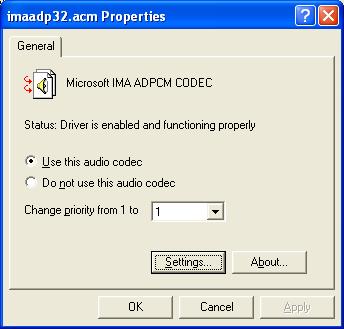Microsoft ADPCM CODEC - Driver Interface for Easy CD-DA Extractor 3 Versions: 1.0.0.1 - 2006-10-31 (Latest) 1.0.0.1. Before continuing on to install the Adpcm.dll file, you need to download the file. If you have not downloaded it yet, download it before continuing on to the installation steps. Microsoft C Runtime Library. The USB Audio Codec disappaers when I unplug the usb cable of the speakers and update the hardware. They will install their.
ADPCM Overview • • 3 minutes to read In this article Adaptive Differential Pulse Code Modulation (ADPCM) is a lossy compression format that is implemented for XAudio2 to provide additional features for specifying the size of the compression sample block. With a lossy compression format some data is altered and lost during compression. ADPCM can achieve compression ratios of up to 4:1. The implementation of ADPCM for XAudio2 provides additional features to specify the size of the compression sample block. ADPCM enables the audio designer to choose a setting that is an appropriate compromise among size, quality, and resolution (for placing loop points).
XAudio2 uses a modified version of the Microsoft ADPCM codec that supports the extended data formatting required to provide custom sample block sizes. For this reason, XAudio2 audio data cannot be played by audio engines that do not support this version of the ADPCM codec.
Spi flash tiny tools. Size: 494 MB Total Phase Aardvark: [ul]The Aardvark I2C/ spi Host Adapter is a fast and powerful I2C bus and SPI bus host adapter through USB. It allows a developer to interface a Linux or Windows PC to a downstrea. Size: 320.41K Calculate spi, CPI, CGPA and CGPA to Percentage GTU SPI Calculator is a handy and reliable application designed to calculate your current semester performance in the Gujarat Technological University. Size: 246.09K Asagao is an easy to use tool designed to offer users a handy SPI- FLASH programmer.
Note Currently, ADPCM compression is only available for Windows, including XNA Game Studio Express for Windows deployments. ADPCM Encoding Audio data is encoded to ADPCM using the AdpcmEncode command-line tool. • AdpcmEncode In order to encode audio files as ADPCM for use with XAudio2, use the AdpcmEncode command-line tool. ADPCM Decoding Software decoding of ADPCM is supported in XAudio2. • XAudio2 In order to use ADPCM encoded data in XAudio2, you need to initialize a ADPCMWAVEFORMAT structure with ADPCM specific values, and pass it as an argument to when you create a source voice. For an example of loading and playing a sound in XAudio2, see. SamplesPerBlock ADPCM compression works by separating the waveform into blocks, and predicting the variation of the waveform samples within each block.

The size of the blocks is measured in samples. The smallest block size is 32 samples, and the highest is 512 samples.

Larger blocks allow better compression, which results in smaller file sizes, but at the expense of sound quality and resolution for aligning loop points. In general, modifying the SamplesPerBlock value results in these tradeoffs: If SamplesPerBlock. File Compression Sound Quality Loop Point Resolution Increases (up to max 512) Increases Decreases Decreases Decreases (down to min 32) Decreases Increases Increases Restrictions Because ADPCM uses sample blocks that are aligned one after the other, a wave compressed with ADPCM may have an unfinished, partial block at its end.
The ADPCM decoder generates silence for the remainder of this partial block, which keeps the wave from looping seamlessly. The value of the SamplesPerBlock parameter affects the resolution with which you can align wave data and loop points. If you try to apply compression to a non-aligned wave, you will get an error or a warning depending on whether the wave is used in any looping play events. You cannot compress a wave used in any looping play events. Remove it from the looping play events, and re-apply compression. If you use the wave exclusively in non-looping mode, the sample block alignment restriction does not apply. ADPCM File Structure An ADPCM file is a standard RIFF file with the following chunk types.